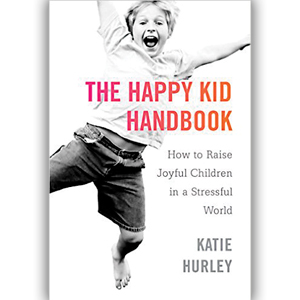Play is Path to Happiness: A Review of The Happy Kid Handbook
 Trying to raise a joyful child in a stressful world? This month, I decided to review The Happy Kid Handbook by Katie Hurley because I liked the idea that focusing on the individual child, as opposed to following popular trends, led to a happy kid. Using numerous anecdotes, Hurley, a child psychotherapist, provides a back-to-basics guide to parenting with strategies for practicing empathy, building assertiveness, and embracing differences.
Trying to raise a joyful child in a stressful world? This month, I decided to review The Happy Kid Handbook by Katie Hurley because I liked the idea that focusing on the individual child, as opposed to following popular trends, led to a happy kid. Using numerous anecdotes, Hurley, a child psychotherapist, provides a back-to-basics guide to parenting with strategies for practicing empathy, building assertiveness, and embracing differences.
Hurley argues when the word parent shifted from a noun, something one is, to a verb, something one does, it led to information overload. She references current theories – such as attachment parenting, free-range parenting, and mindful parenting – and explains parents have become so caught up in these methods they have lost sight of the child in front of them. The path to a happy kid is as individualized as the child herself. Therefore, Hurley strives to help parents know their child and make decisions accordingly.
I could relate to this approach because since I started Parenting by the Book in 2010 I’ve reviewed nearly 70 titles. While they have many suggestions in common – limit screen time, encourage free play, and set boundaries – each has also offered some unique insights. As a result, I’ve never identified with one parenting style or recommended one specific book. Instead, when pressed, I tend to list my favorites and explain the strengths of each.
The Happy Kid Handbook begins by explaining the importance of knowing your child’s strengths. This is not so parents can focus on them exclusively but so they can better understand how to meet their needs. If you have more than one child, you know first-hand that no two children are alike. Still, many parents treat their children the same in an effort to be fair. Hurley gives tips to understanding different personalities, like how to teach flexibility and how to prevent emotional overload.
Next, Hurley argues the power of play. She explains, “A misconception about ‘creativity’ is that it is restricted to the arts. If a child is more puzzle-oriented then painting-oriented, that child might be viewed as lacking creativity.” But it’s just not true. Hurley believes creativity is about making new things by tapping into the imagination. This is something play perpetuates, along with connectedness and concern for others.
Hurley is quick to clarify that she is not talking about play groups. She believes their directed manner leads to learned helplessness and puts parents on a path of constantly enrolling children in ‘age-appropriate’ classes. What kids really need is sufficient unscheduled time for play.
Hurley believes one of the biggest obstacles to making this happen is the modern parents’ insecurity when it comes to structure. “Filling the downtime with more activities might make it easier for a stressed-out parent (no worries about how to pass the time), but it robs children of time to play, learn on their own terms, and create,” Hurley argues.
While Hurley covers other important elements of happiness, her insistence at making time for play really resonated with me (probably because I just finished writing an article for Richmond Family Magazine on the importance of recess). Hurley explains, “It can take thirty to sixty minutes to plan, develop, and act out a high-level play scenario.” Think costumes, props, and sets. “When unstructured play is continually disrupted to allow for more structured activities, children don’t have the opportunity to work through the process that makes play meaningful.”
I particularly liked how Hurley reiterated, “Creating a play-friendly environment does not mean that your kids take over every room in the house.” As I write this review, a Littlest Pet Shop “city” is set up in my family room and my daughters are upstairs singing karaoke. But as Hurley recommends, they will clean up this adventure before they start the next. After all, only happy parents can raise happy kids. (There’s a great chapter on how to be a happy parent, too.)
So if you think parenting advice has gotten too complicated, then check out The Happy Kid Handbook by Katie Hurley for suggestions on how to be joyful in a stressed out world.
Follow @ParentbytheBook on Twitter for updates on blog posts or like Parenting by the Book on Facebook.






